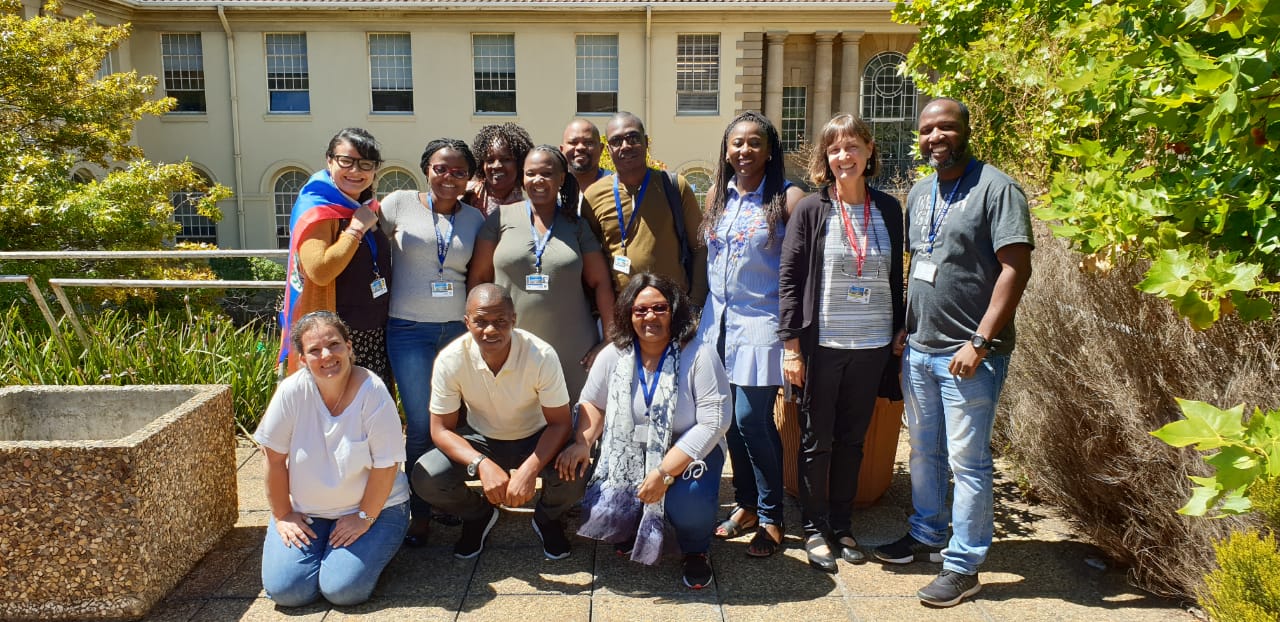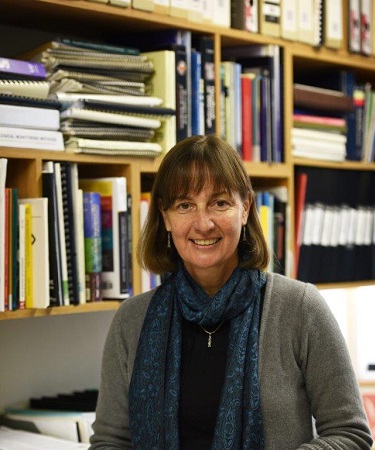Welcome to the Division of Environmental Health
The Environmental Health Division commenced in 2014. According to the World Health Organization, environmental factors account for approximately one third of the global burden of disease, with children under five carrying the brunt. The key objective of the Environmental Health Division is to develop capacity in Low and Middle-Income Countries (LMICs), particularly Africa, to address environmental health risks and reduce the resulting burden of disease. We do this through a post graduate programme in Pesticide Risk Management, teaching seminars and supervising PhD and MPH students in Environmental Health, training of government professionals addressing environmental health risks, and building capacity through innovative electronic forums and networking.
To learn more about our Programmes, watch the video
Environmental health is the study of how environmental factors can harm and impact on human health, as well as how to identify, prevent and manage such effects. The Division of Environmental Health (DEH) offers a selection of activities to facilitate addressing environmental health, particularly in LMIC's, from teaching, research to community and government engagement. The DEH offers students and professionals post graduate and capacity building training and skills development for application to diverse environments. Our primary research informs and contributes to our active involvement with national and international policies.
We invite you to contact us and review our activities which range from:
Environmental Health Seminars
The Division provides teaching on the 1st year’s course ‘Becoming a Health Professional’, offered to all students in the Faculty of Health Sciences. The seminar introduces students to the concept of environmental health, including exposure history taking, as it fits in the social determinants of health framework.
The Division also delivers seminars to 4th-year medical students in the ‘Health in Context’ course. The environmental health teaching focuses on equipping students with skills to be able to diagnose environment-related diseases through environmental exposure history taking and advise patients on prevention measures.
Climate Change and Health Seminars
These are offered to the following UG students by means of a class lecture, related readings and assessment by means of a short essay question (yr 3) and EOB exam question (yr 4):
- year 1 (BHP course, related to the Environmental & social determinants of health),
- year 3 (Critical Health Humanities in BaDr course, specifically the impacts of global and local environmental change on diabetes & NCDs, PBL case 17)
- year 4 (Health in Context course, specifically the role of health professionals in protecting health from climate change impacts
Lecturers
Prof Hanna-Andrea Rother
Mr James Irlam
Prof Aqiel Dalvie
Professional Masters in Chemical Risk Management (MCRM)
The MCRM is aimed at health professionals, chemists, biologists, sociologists, anthropologists, ecologists, agronomists, toxicologists and other professionals working full time in chemicals management. The programme is a two-year part-time flexible learning programme (large distance learning component), including a mandatory two-week residential session at UCT at the beginning of the two-year cycle. There will be substantial requirements for homework in the form of assignments and project related work, expected self-directed learning and regular communication between students and lecturers extending over the two years.
Applicants must apply online by 30 September
Programme Convenor: Prof Hanna-Andrea Rother
Contact Information
Direct all enquiries to the Division Administrator, mcrm@uct.ac.za
Further Details
Download the MCRM Flyer and Programme Brochure for more details.
_____________________________________
Master of Public Health specialising in Environmental Health
The Environmental Health track is intended for those candidates who are interested in understanding the environmental influences on human health, the policy implications, and how to identify, reduce and manage environmental health risks. Candidates will develop an understanding of key environmental health burden of diseases (i.e., chemicals, climate change, indoor and outdoor air pollution and the built environment) with a particular focus on children's environmental health issues. Coursework will prepare candidates to identify suitable interventions from decision makers to community residents.
Track Convenor: Prof Hanna-Andrea Rother
Contact Information
Direct all enquiries to the Programme Administrator, Mrs Tshamani Netshifhefhe
Further Details
Download the Environmental Health track flyer and programme brochure for more details.
Applicants must apply online by 31st July (International) & 31st October (SA)
__________________
Post Graduate Diploma in Pesticide Risk Management (DPRM)
The DPRM Programme is a two-year part-time flexible learning programme (large distance learning component) targeting professionals in the field of pesticide and chemicals risk management. It includes a mandatory two-week residential session at UCT at the beginning of the two-year cycle. There will be substantial requirements for homework in the form of assignments and project related work, expected self-directed learning and regular distance communication between students and lecturers extending over the two years.
Programme Convenor: Prof Hanna-Andrea Rother
Contact Information
Direct all enquiries to the Division Administrator, dprm@uct.ac.za
Further Details
Download the DPRM Flyer and Programme Brochure for more details.

Diploma in Pesticide Risk Management - Class of 2019
The Environmental Health Division is involved in several projects that aim to improve health, particularly for vulnerable populations, through capacity building in the areas of chemicals and pesticides.
The Division of Environmental Health conducts research on identifying and implementing the most suitable approaches for capacity building of professionals in Low and Middle Income Countries. These include, yet are not limited to, distance learning, electronic networking and environmental health seminars via the internet.
Possible PhD and Master of Public Health thesis topics to be pursued under the supervision of Division staff include:
- Pesticides
- Chemicals: toxicity, exposure assessment, risk assessment and risk management strategies (including endocrine disruption, metals)
- Environmental pollution including air pollution, hazardous chemicals, contaminated water
- Interventions and prevention of environmental health risks (implementation science)
- Improving risk communication of environmental health risks, particularly for low-literate populations (translational science)
- Environmental health literacy for the general population and health professionals
- Climate change and health including policy, chemicals and heat stress
- Environmental health policy analysis nationally, regionally and globally including relevant multilateral environmental agreements
Andrea Rother, Professor and Head of Division 
Email: Andrea.Rother@uct.ac.za Phone: 021 406 6721 Twitter: @harother
Prof Rother is the convenor of UCT’s Postgraduate Diploma in Pesticide Risk Management and the Master of Public Health Environmental Health Track. Nationally she is a member of government’s Multi-stakeholder Committee on Chemicals Management and the South African Bureau of Standards Pesticide Technical Committee. Prof Rother is also a WHO expert advisor and current chair of the FAO/WHO Joint Meeting on Pesticide Management. |
Aqiel Dalvie, Professor and Deputy Director: Centre for Environmental and Occupational Health Research (CEOHR) 
Email: Aqiel.Dalvie@uct.ac.za Phone: 021 406 6610
|
Ilzé Engelbrecht, Senior Lecturer 
Email: ilze.engelbrecht@uct.ac.za
Dr Ilzé Engelbrecht has a PhD in environmental science with a quantitative chemical background. Her areas of expertise include occupational and environmental health, with a specific focus on the use of mammalian tissue cultures to investigate the toxicological effects of chemicals, environmental mixtures, and occupational hazards (including hazardous chemical and biological agents). She recently completed a postdoctoral research fellowship specialising in investigating toxicological effects of chemicals on workers and leading on online teaching of environmental health. Ilzé teaches and co-convene courses for the Professional Master’s in Chemical Risk Management and contributes to the Division's research portfolio. |
James Irlam, Senior Lecturer 
Email: James.Irlam@uct.ac.za Phone: 021 406 6377
Teaching & Research Fields |
Meryl Jagarnath, nGap Lecturer 
Email: Meryl.Jagarnath@uct.ac.za
Dr Meryl Jagarnath has a PhD in Environmental Sciences from the University of KwaZulu-Natal (obtained in 2019). She has a background in both physical and human geography and her research interests lies in studying the interactions and impacts between people and the environment. Dr Jagarnath's doctoral thesis focused on urban climate and heat stress in Durban to identify vulnerable populations that at most at risk of climate change attributed to physical exposure, socio-demographic profiles, and livelihoods and she has published several journal articles from that work. Dr Jagarnath particularly enjoys using spatial tools such as Geographic Information Systems (GIS) and Remote Sensing (RS) to unpack the links between people and the environment from the local to global scale. She has two years post-doctoral experience at the University of Southampton (United Kingdom) working in the Building Research Capacity for sustainable food and water security in sub-Saharan Africa (BRECCIA) project investigating the links between climate vulnerability and food and water insecurity in various dryland communities, with extensive fieldwork experience in rural sub-Saharan Africa. |
Honorary Professor
| Karim Ahmed |
Honorary Associate Professors
| Samuel Fuhrimann |
| Sari Kovats |
Honorary Senior Lecturers
| Euripides (Rico) Euripidou |
| Achim Halpaap |
| Gamini Manuweera |
| Mary Miller |
| Wells Utembe |
| Nosiku S Munyinda |
Sheila Willis Sheila has over 20 years’ experience working to promote the sustainable management of pests and the reduction of harmful effects of pesticides. She has worked in Africa, the Former Soviet Union and the Caribbean. Her academic background is in Agricultural Zoology / Entomology and she is Head of International Programmes at Pesticide Action Network UK. As a doctoral student Sheila tutored undergraduates in Entomology and Pests and Diseases at Oxford University before working in farmers’ participatory research in Ethiopia and Kenya. More recently Sheila has been concerned with broader aspects of pesticide management, including Highly Hazardous Pesticides, monitoring acute pesticide poisoning and the impact of agroecological practices in cotton and other crops. She also teaches parts of the Post Graduate Diploma in Pesticide Risk Management at the University of Cape Town and has undertaken assignments for UN FAO, UNEP and the secretariats of the chemical conventions. |
Research Staff
| Name | Description | |
|---|---|---|
| Maxine Jonker | Project Manager |
Administrative Staff
| Name | Description | Telephone No | ||
|---|---|---|---|---|

| Nabeelah Omar | Administrative Assistant | 021 650 7661 |
Publications
2026
Peter Ssekkadde, Vica Marie Jelena Jonitz, Aggrey Atuhaire, Curdin Brugger, Mohamed Aqiel Dalvie, Hanna-Andrea Rother, Martin Röösli, Jennifer Inauen, Samuel Fuhrimann. Behavior change through educational interventions and text messaging to improve personal protective equipment use during pesticide handling among smallholder farmers in Uganda: A cluster randomized controlled trial, Journal of Environmental Management, Volume 400, 2026, 128760, ISSN 0301-4797
Tom Gaulton, Mari Langreiter, Lydia Izon-Cooper, Haydn Cole, Sari Kovats, Hanna-Andrea Rother, Kerry A Broom, Sarah Dack, Ariana Zeka, Sibylle Ermler, Chris Collins, Iain Lake, Jo Wybrow, Hannah R Littler and Raquel Duarte-Davidson. (2026) Exploring the interactions between climate change, chemical exposures and public health. Environmental Research – Health 4 013001. DOI 10.1088/2752-5309/ae3597
Nadia Suzette Botha, Ilzé Engelbrecht, Suranie Rachel Horn. Analysis of occupational exposure limits for hazardous chemical agents of African countries: A comparative study. Regulatory Toxicology and Pharmacology, Volume 166, March 2026, 106029
- Ilzé Engelbrecht, Johan L du Plessis, Sonette du Preez, John P Giesy, Rialet Pieters & Suranie R Horn. In vitro cytotoxicity and oxidative stress of Ti6Al4V and 316L stainless steel powders used in additive manufacturing. Journal of Toxicology and Environmental Health, Part A https://doi.org/10.1080/15287394.2025.2603925
2025
Ssekkadde P, Tomberge VMJ, Brugger C, Atuhaire A, Dalvie MA, Rother H-A, Röösli M, Inauen J, Winkler MS and Fuhrimann S (2025) Educational Intervention Effects on Pesticide-Related Knowledge, Attitudes, Practices, Exposure, and Health Among Ugandan Smallholder Farmers: A Cluster Randomized Controlled Trial. Int. J. Public Health 70:1608952. doi: 10.3389/ijph.2025.1608952
Jonker M, Karunarathne A, Utyasheva L, Eddleston M, Konradsen F, Rother HA. Current pesticide suicide surveillance methods used across the African continent: a scoping review. BMJ Open. 2025 Oct 9;15(10):e103770. doi: 10.1136/bmjopen-2025-103770. PMID: 41067770; PMCID: PMC12516983.
Phakisi, T. K., Weimann, E., & Rother, A. (2025). The Interlinkages Between Ambient Temperature and Air Pollution in Exacerbating Childhood Asthma: A Time Series Study in Cape Town, South Africa. Children, 12(12). https://doi.org/10.3390/children12121634
Rebecca Mlelwa, Hanna-Andrea Rother. Intersecting circular economy and child health: A scoping review of legacy brominated flame retardants in plastic childcare products and toys, Chemosphere, Volume 377, 2025, 144354, ISSN 0045-6535, https://doi.org/10.1016/j.chemosphere.2025.144354.
2024
- Mlelwa, R., Rother, H.-A. Reviewing the current state of legacy POP-brominated flame retardants in plastic childcare products and toys: a scoping review protocol. Syst Rev 13, 148 (2024). https://doi.org/10.1186/s13643-024-02524-1
- Irlam, J., Reid, S., & Rother, H.-A. (2024). Education about Planetary Health and Sustainable Healthcare in low- and middle-income countries: Planetary Health Report Card assessment of perceptions at University of Cape Town Faculty of Health Sciences. Education for Health, 37(1), 8–19. https://doi.org/10.62694/efh.2024.17
- Utyasheva L, Rother H.-A, London L & Eddleston M (2024). Stop blaming the farmer: Dispelling the myths of ‘misuse’ and ‘safe’ use of pesticides to protect health and human rights. Journal of Human Rights, DOI: 10.1080/14754835.2024.2334802
- Irlam JH, Reid S, Rother H.-A. Education about planetary health and sustainable health care in low- and middle-income countries: A planetary health report card assessment of perceptions at the University of Cape Town Faculty of Health Sciences. Education for Health (January-March 2024) 37:1 in press.
- Irlam J. Reid SJ, Rother H-A. (2024). Education about Planetary Health and Sustainable Healthcare: a national Delphi panel assessment of its integration into health professions education in South Africa. African Journal of Health Professions Education 2024;16(1).
2023
- Cains, M.G., Desrousseaux, A.O.S., Boxall, A.B.A., Molander, S., Molina‐Navarro, E., Sussams, J., Critto, A., Stahl, R.G. and Rother, H-A. 2023. Environmental management cycles for chemicals and climate change, EMC4: A new conceptual framework contextualizing climate and chemical risk assessment and management, Integrated Environmental Assessment and Management, 20(2),pp. 433–453.
- Hanna-Andrea Rother, C. MacKenzie Dove, Rosalind Cornforth, Celia Petty, Rico Euripidou, James Irlam, David Gikungu, Tawanda Chivese, Waltaji Kutane, Adjinda Jourou, Bianca van Bavel, Carol Zavaleta and Caradee Y. Wright. ‘Q-Storming’ to Identify Challenges and Opportunities for Integrating Health and Climate Adaptation Measures in Africa. Journal of Climate Change and Health. 2023.v12.100254. DOI: 10.1016/j.joclim.2023.100254
- Irlam J, Dreyer A, Filies G, Govender L, Jacob N, Jayakumar J, Lokotola CL, Naidoo R, Reid SJ, Rother H-A. (2023). Education about Planetary Health and Sustainable Healthcare: a national audit of health professions education curricula in South Africa. African Journal of Health Professions Education 2023; 15(4).
- Irlam, J, Razzak, Z, Parker, Q A, & Rother, H-A. (2023). Student knowledge and perceptions of climate change and environmental sustainability at the Faculty of Health Sciences, University of Cape Town, South Africa. African Journal of Health Professions Education, 15(1), 4-8.
- Davies Bronwen, Hlela Marie Belle Kathrina Mendoza, Rother Hanna-Andrea. Child and adolescent mortality associated with pesticide toxicity in Cape Town, South Africa, 2010-2019: a retrospective case review. BMC Public Health 2023; 23-792.
2022
- Brassell M, Karunarathne A, Utyasheva L, Eddleston M, Konradsen F, Rother H-A. “Current pesticide suicide surveillance methods used across the African continent: a scoping review protocol”. BMJ Open 2022;12:e055923. doi: 10.1136/bmjopen-2021-055923
- Röösli, M.; Fuhrimann, S.; Atuhaire, A.; Rother, H.-A.; Dabrowski, J.; Eskenazi, B.; Jørs, E.; Jepson, P.C.; London, L.; Naidoo, S.; Rohlman, D.S.; Saunyama, I.; van Wendel de Joode, B.; Adeleye, A.O.; Alagbo, O.O.; Aliaj, D.; Azanaw, J.; Beerappa, R.; Brugger, C.; Chaiklieng, S.; Chetty-Mhlanga, S.; Chitra, G.A.; Dhananjayan, V.; Ejomah, A.; Enyoh, C.E.; Galani, Y.J.H.; Hogarh, J.N.; Ihedioha, J.N.; Ingabire, J.P.; Isgren, E.; Loko, Y.L.E.; Maree, L.; Metou’ou Ernest, N.; Moda, H.M.; Mubiru, E.; Mwema, M.F.; Ndagire, I.; Olutona, G.O.; Otieno, P.; Paguirigan, J.M.; Quansah, R.; Ssemugabo, C.; Solomon, S.; Sosan, M.B.; Sulaiman, M.B.; Teklu, B.M.; Tongo, I.; Uyi, O.; Cueva-Vásquez, H.; Veludo, A.; Viglietti, P.; Dalvie, M.A. “Interventions to Reduce Pesticide Exposure from the Agricultural Sector in Africa: A Workshop Report.” Int. J. Environ. Res. Public Health 2022, 19, 8973.
- Fuhrimann, Samuel, Chenjie Wan, Elodie Blouzard, Adriana Veludo, Zelda Holtman, Shala Chetty-Mhlanga, Mohamed A. Dalvie, Aggrey Atuhaire, Hans Kromhout, Martin Röösli, and Hanna-Andrea Rother. 2022. "Pesticide Research on Environmental and Human Exposure and Risks in Sub-Saharan Africa: A Systematic Literature Review". International Journal of Environmental Research and Public Health 19, no. 1: 259.
2021
- Hanna-Andrea Rother, R. Anna Hayward, Jerome A. Paulson, Ruth A. Etzel, Mary Shelton, and Linda C. Theron. “Impact of extreme weather events on Sub-Saharan African child and adolescent mental health: a systematic review of sparse research findings.” Journal of Climate Change and Health 2021, 5: 100087.
- Bonolo Pududu and Hanna-Andrea Rother. “Whose Jurisdiction is Home Contamination? Para-Occupational ‘Take-Home’ Herbicide Residue Exposure Risks among Forestry Workers’ Families in South Africa”. Int. J. Environ. Res. Public Health 2021,18(19), 10341
- Rother, H., 2021. Pesticide suicides: what more evidence is needed to ban highly hazardous pesticides? The Lancet Global Health, 9(3), pp.e225-e226.
2020
- Zinyemba, C., Archer, E. and Rother, H., 2020. Climate Change, Pesticides and Health: Considering the Risks and Opportunities of Adaptation for Zimbabwean Smallholder Cotton Growers. International Journal of Environmental Research and Public Health, 18(1), p.121.
- Rother Hanna-Andrea, Etzel RA, Shelton M, Paulson JA, Hayward RA, Theron LC. Impact of Extreme Weather Events on Sub-Saharan African Child and Adolescent Mental Health: A Protocol for a Systematic Review. Atmosphere 2020, 11, 493.
- Rother Hanna-Andrea. Controlling and preventing climate-sensitive noncommunicable diseases in urban sub-Saharan Africa. Science of the Total Environment 2020, 727.
- Rother Hanna-Andrea, John Juanette, Wright Caradee Y., Irlam James, Oosthuizen Riëtha, Garland Rebecca M. Perceptions of Occupational Heat, Sun Exposure, and Health Risk Prevention: A Qualitative Study of Forestry Workers in South Africa. Atmosphere 2020, 11(1), 37.
- Fuhrimann S, Klanov J, Pribylov P, Kohoutek J, Dalvie MA, Roosli M, Degrendele C. 2020. Qualitative assessment of 27 current-use pesticides in air at 20 sampling sites across Africa. Chemosphere; 258: 1273.
- Olaniyan T, Dalvie MA, Röösli M , Naidoo R, Künzli N, de Hoogh K, Berman D, B Parker, J Leaner, M Jeebhay. 2020. Short term seasonal effects of airborne fungal spores on lung function in a panel study of schoolchildren residing in informal settlements of the Western Cape of South Africa. Environ Pollut.; 260:114023.
- Curchod L, Oltramare C, Junghans M; Stamm C, Dalvie MA, Röösli M, Fuhrimann M. 2020. Temporal variation of pesticide mixtures in rivers of three agricultural watersheds during a major drought in the Western Cape, South Africa. Water Research X; 6: 100039.
- Olaniyan T, Jeebhay M, Röösli M, Naidoo RN, Künzli N, de Hoogh K, Saucy S, Badpa M, Baatjies R, Parker B, Leaner J, Dalvie MA. 2020. The association between ambient NO2 and PM2.5 with the respiratory health of school children residing in informal settlements: A prospective cohort study. Environ Res. 186:109606.
- Fix, J, Annesi-Maesano I, Baldi I, Boulanger M, Cheng S, Cortes S, Dalphin JC, Dalvie MA, DeganoB, Douwes J, Eduard W, Elholm G, Ferreccio C, Harding AH, Jeebhay M, Kelly KM, Kromhout H, MacFarlane E, Maesano CN, Mitchell DC, Mwanga H, Naidoo S, Negatu B, Ngajilo D, Nordby KC, Parks CG, Schenker MB, Shin A, Sisgaard T, Sim M, Soumagne T, Thorne P, Yoo KY & Hoppin JA. 2020. Gender differences in respiratory health outcomes among farming cohorts around the globe: Findings from the AGRICOH consortium. Journal of Agromedicine
- Chetty-Mhlanga S, Fuhrimann S, Eeftens M, Basera W, Hartinger S, Dalvie M. A, Röösli M. 2020. Different aspects of electronic media use, symptoms and neurocognitive outcomes of children and adolescents in the rural Western Cape region of South Africa. Environ Res. 184:109315.
2019
- Day Kirsten, Patel Zarina, Rother Hanna-Andrea. 2019. Applying social risk theory to competing constructions of risk in environmental assessment. Environmental Impact Assessment Review. 79:106312
- Kabanda Siti and Rother Hanna-Andrea. (2019). Evaluating a South African mobile application for healthcare professionals to improve diagnosis and notification of pesticide poisonings. BMC Medical Informatics and Decision Making 19:40.
- Godsmark CN, Irlam J, van der Merwe F, New M and Rother H-A. (2019). Priority Focus Areas for a Sub-National Response to Climate Change and Health: A South African Provincial Case Study. Environment International 122:31–51.
- Walpole Sarah Catherine, Barna Stefi, Richardson Janet, Rother Hanna-Andrea. (2019). Sustainable healthcare education: integrating planetary health into clinical education. Lancet Planetary Health Vol 3 January.
- Swartz A, Levine S, Langerman F, Rother H-A. (2019). Toxic layering through three disciplinary lenses: Childhood poisoning and street pesticide use in Cape Town, South Africa. Medical Humanities.
- Olaniyan T, MA Dalvie, M Röösli , R Naidoo, N Künzli, K de Hoogh, B Parker, J Leaner , M Jeebhay. 2019. Asthma-related outcomes associated with indoor air pollutants among schoolchildren from four informal settlements in two municipalities in the Western Cape Province of South Africa. Indoor Air. 29(1):89-100.
2018
- Chetty-Mhlanga S, Basera W, Fuhrimann S, Probst-Hensch N, Delport S, Mugari M, Van Wyk J1, Röösli M, Dalvie MA. 2018. A prospective cohort study of school-going children investigating reproductive and neurobehavioral health effects due to environmental pesticide exposure in the Western Cape, South Africa: Study protocol. BMC Public Health 18(1):857.
- Sieber C, Ragettli MS, Brink M, Olaniyan T, Baatjies R, Saucy A, Vienneau D, Probst-Hensch N, Dalvie MA, Röösli M. 2018. Comparison of sensitivity and annoyance to road traffic and community noise between a South African and a Swiss population sample. 2018. Environ Pollut.; 241:1056-1062. (ISI Accredited).
- Sagar S, SM, Struchen B, Loughrand SP, Brunjesi ME, Arangua L, Dalvie MA , Croft RJ, Michael Jerrett M, Moskowitz JM, Kuo T, Röösli M. 2018. Comparison of radiofrequency electromagnetic field exposure levels in different everyday microenvironments in an international context. Environment International 114, 297–306.
- Glass T, Dalvie MA, Holtman, Vorster A, MSc, Ramesar RS, London L. 2018. DNA variants and organophosphate neurotoxicity among emerging farmers in the Western Cape of South Africa. Am J Ind Med; 61:11–20.
- Rother Hanna-Andrea. 2018. Pesticide labels: Protecting liability or health? – Unpacking “misuse” of pesticides. Current opinion in Environmental Science & Health, 4:10-15.
- Mathee Angela, Barnes Brendon, Naidoo Shan, Swart Andre & Rother Hanna-Andrea. 2018. Development for children's environmental health in South Africa: Past gains and future opportunities. Development Southern Africa. Pp 1-11.
- Zinyemba C, Archer E, Rother H-A (2018). Climate variability, perceptions and political ecology: Factors influencing changes in pesticide use over 30 years by Zimbabwean smallholder cotton producers. PLOS One, 13(5): e0196901.
- Chetty-Mhlanga S, Basera W, Fuhrimann S, Probst-Hensch N, Delport S, Mugari M, Van Wyk J, Röösli M, Dalvie MA. 2018. A prospective cohort study of school-going children investigating reproductive and neurobehavioral health effects due to environmental pesticide exposure in the Western Cape, South Africa: Study protocol. BMC Public Health.;18(1):857. (ISI Accredited).
- Sieber C, Ragettli MS, Brink M, Olaniyan T, Baatjies R, Saucy A, Vienneau D, Probst-Hensch N, Dalvie MA, Röösli M. 2018. Comparison of sensitivity and annoyance to road traffic and community noise between a South African and a Swiss population sample. 2018. Environ Pollut.; 241:1056-1062. (ISI Accredited)
- Saucy A, Röösli M, Künzli N, Tsai M, Sieber C, Olaniyan T, Baatjies R, Jeebhay M, Davey M, Flückiger B, Naidoo R, Dalvie MA, Badpa M, and de Hoogh K. 2018. Land Use Regression Modelling of Outdoor NO2 and PM2.5 Concentrations in Three Low Income Areas in the Western Cape Province, South Africa. Int. J. Environ. Res. Public Health, 15, 1452; (ISI Accredited)
- Sagar S, SM, Struchen B, Loughrand SP , Brunjesi ME , Arangua L , Dalvie MA , Croft RJ , Michael Jerrett M, Moskowitz JM, Kuo T, Röösli M. 2018. Comparison of radiofrequency electromagnetic field exposure levels in different everyday microenvironments in an international context. Environment International 114, 297–306.
- Glass T, Dalvie MA, Holtman, Vorster A, MSc, Ramesar RS, London L. 2018. DNA variants and organophosphate neurotoxicity among emerging farmers in the Western Cape of South Africa. Am J Ind Med. 2018; 61:11–20. (ISI Accredited).
2017
- Olaniyan T, Jeebhay MF, Roosli M, Naidoo R, Baatjies R, Künzli N, Tsai M, Davey M, de Hoogh K, Berman D, Parker B, Leaner J, Dalvie MA. A prospective cohort study on ambient air pollution and respiratory morbidities including childhood asthma in adolescents from the Western Cape province: Study Protocol. BMC Public Health (2017) 17:712, 1-13.
- Sieber C, Ragettli MS, Brink M, Olaniyan T , Baatjies R, Probst-Hensch N, Dalvie MA, Röösli M. Land Use Regression Modeling of Outdoor Noise Exposure in Informal Settlements in Western Cape, South Africa. Int. J. Environ. Res. Public Health, 14, 1262.
- Sathar F, Dalvie MA, Rother H-A. (2017). Demographic determinants of chemical safety information recall in workers and consumers in South Africa: a cross sectional study. Journal of Safety Research, 63:61-71.
- Walpole S, Vyas, A, Maxwell J, Canny B, Woollard R, Welberby C, Leedham-Green K, Musaeus P, Tufail-Hanif U, Patricio KP, Rother H-A. (2017). Building an environmentally accountable medical curriculum through international collaboration. Medical Teacher.
- Hunter-Adams J. and Rother H-A. (2017). A Qualitative study of language barriers between South African health care providers and cross-border migrants. BMC Health Services Research, 17:97.
- Lekei EE, Ngowi AV, London L. Knowledge and practices relating to acute pesticide poisoning among health care providers in selected regions of Tanzania. Environmental Health Insights. 2017 (1-11).
- Lekei E, Ngowi AVF, London L. Acute Pesticide Poisoning in Children: Hospital Review in Selected Hospitals of Tanzania. Journal of Toxicology; 2017: Article ID 4208405, 8 pages, 2017.
2016
- Mwanga HH, Dalvie MA, Singh T, Channa K, Jeebhay MF. Relationship between pesticide metabolites, cytokine patterns and asthma-related outcomes in rural women workers. International Journal of Environmental Research and Public Health, 2016,13(10), 957, 1-14.
- Mao J and Dalvie MA. 2016. Anthropometric Measurements, Serum Reproductive Hormonal Levels and Sexual Development among Boys in the Rural Western Cape, South Africa. Int. J. Environ. Res. Public Health 13, 1185.
- Mwanga HH, Dalvie MA, Singh TS, Channa K and Jeebhay MF. 2016. Relationship between Pesticide Metabolites, Cytokine Patterns, and Asthma-Related Outcomes in Rural Women Workers. Int. J. Environ. Res. Public Health 13, 957.
- F Sathar, M A Dalvie, HA Rother. 2016. Review of the literature on demographic determinants of chemical hazard information recall. Int. J. Environ. Res. Public Health 12, 6281-6299.
- Willems M, Dalvie MA, London L, Rother HA. 2016. Health Risk Perception Related to Fracking in the Karoo, South Africa. Environmental Practice; 18: 1-16.
- Hunter-Adams J, Landon M. and Rother H-A. (2016). Perceptions related to breastfeeding and the early introduction of complementary foods amongst migrants in Cape Town, South Africa. International Breastfeeding Journal, 11:29.
- Rother H-A. (2016). Pesticide vendors in the informal sector: trading health for income. New Solutions: A Journal of Environmental and Occupational Health Policy, 26(2): 241-252.
- Hunter-Adams J and Rother H-A. (2016). Pregnant in a foreign city: A qualitative analysis of diet and nutrition for cross-border migrant women in Cape Town, South Africa. Appetite, 103: 403-410.
- London L, Kisting S. The Extractive Industries: Can We Find New Solutions to Seemingly Intractable Problems? New Solut 2016; 25:421-430.
- Lekei EE, Ngowi AV, London L. Under-reporting of acute pesticide poisoning in Tanzania: modelling results from two cross-sectional studies. Environ Health. 2016 Nov 29; 15 (1):118.
2015
- Motsoeneng PM, Dalvie MA. 2015. Relationship between Urinary Pesticide Residue Levels and Neurotoxic Symptoms among Women on Farms in the Western Cape, South Africa. Int. J. Environ. Res. Public Health 12, 6281-6299.
- Andrade-Rivas F, H-A Rother (2015). Chemical exposure reduction: Factors impacting on South African herbicide sprayers’ personal protective equipment compliance and high risk work practices. Environmental Research 142: 34-45.
- Rother H-A (2015). Addressing Pesticide Risk Management and Risk Reduction through Distance Learning Education. Outlooks on Pest Management 26(2):66-71.
- Bennin F, Rother H-A (2015). “But it's just paracetamol”: Caregivers’ ability to administer over-the-counter painkillers to children with the information provided. Patient Education and Counseling 98:331-337.
- Olaniyan TA, Dalvie MA, Jeebhay MF. Ambient air pollution and childhood asthma: A Review of South African epidemiological studies. Current Allergy and Clinical Immunology, 28(2);122-126, 2015.
2014
- Dalvie MA, Sosan B, Cairncross E, London L. Environmental monitoring of pesticide residues from farms at a neighbouring primary and pre-school in the Western Cape in South Africa. Science of the Total Environment 2014; 466-467C:1078-1084.
- Harker-Burnhams N, Musekiwa A, Parry C, London L. Do workplace substance abuse prevention programmes include a focus on substance-related HIV risk behaviors: A systematic review. African Journal of Drug and Alcohol Studies 2013; 12(1): 1-22.
- Ndlovu V, Dalvie MA, Jeebhay MF. Asthma associated with pesticide exposure among women in rural Western Cape of South Africa. Am J Ind Med, 57:1331–1343, 2014.
- Myers J, London L, Lucchini RG. Neurotoxicology and development: Human, environmental and social impacts. Editorial. Neurotoxicology. 2014 Dec;45:217-9.
- Dalvie MA, Sosan MB, Africa A, Cairncross E, London L.2014. Environmental monitoring of pesticide Residues from farms at a neighbouring primary and pre-school in the Western Cape in South Africa. Science of the Total Environment 466–467: 1078–1084.
- Dalvie MA, Rother HA, London L. 2014. Chemical Hazard Communication Comprehensibility in South Africa: Safety Implications for the adoption of the Globally Harmonized System of Classification and Labeling of Chemicals. Safety Science 61: 51–58.
- Rother, H-A. (2014). Communicating pesticide neurotoxicity research findings and risks to decision-makers and the public. NeuroToxicology 45: 327- 337.
- Health: deliberations of an international workgroup addressing Lekei EE, Ngowi AV, London L. Farmers' knowledge, practices and injuries associated with pesticide exposure in rural farming villages in Tanzania. BMC Public Health 2014; 14:389.
- Lekei E, Ngowi AV, London L. Hospital-based surveillance for acute pesticide poisoning caused by neurotoxic and other pesticides in Tanzania. Neurotoxicology 2014; 45: 318–326.
- Lekei EE, Ngowi AV, London L. Pesticide retailers' knowledge and handling practices in selected towns of Tanzania. Environ Health 2014; 13: 79.
- Dalvie MA. Reproductive health effects of contemporary pesticides used in South Africa. 2014. Research Journal of Chemistry and Environment 18(12).
- Dalvie MA, Africa A, Naidoo S. 2014. Relationship between wood usage and urinary Cr, Cu and As in informal areas of Cape Town. S Afr Med J 2014;104(1):61-64.
2013
- M.A. Dalvie. 2013. DDT: Health Effects, Reference Module in Earth Systems and Environmental Sciences, Elsevier.
- Klaschka Ursula, Rother Hanna-Andrea. 'Read this and be safe!' comparison of regulatory processes for communicating risks of personal care products to European and South African consumers. Environmental Sciences Europe 2013, 25:30.
- Rother H.-A. Challenges in Pesticide Risk Communication, Reference Module in Earth Systems and Environmental Sciences, Elsevier, 2013. 01-Nov-13.
- London L, Rother H-A. (2013) Poisoning and Pesticides. South African Medical Journal, 103(9): 595-596.
2012
- English RG, Perry M, Lee MM, Hoffman E, Delport S, Dalvie MA. 2012. Farm residence and reproductive health among boys in rural South Africa. Environ Int. 47C:73-79.
- London L, Beseler C, BouchardMF, Bellinger DC,Colosio C, Grandjean P, Harari R, Kootbodien T, Kromhout H, Little F, Meijster T, Moretto A, Rohlman DS,Stallones L. Neurobehavioural and neurodevelopmental effects of pesticide exposures. Neurotoxicology 2012; 33: 887–896.
- Roomaney R, Ehrlich R, Rother H-A. (2012). The acceptability of rat trap use over pesticides for rodent control in two poor urban communities in south Africa. Environmental Health 11 (1) 32.
- Ehrlich R, Rother HA. The acceptability of rat trap uses over pesticides for rodent control in two poor urban communities in South Africa. BMC Environ Health 2012. 11:32.
- Rother H-A. (2012). Improving Poisoning Diagnosis and Surveillance of Street Pesticides. South African Medical Journal, 102(6): 485-488.
2011
- Dalvie MA, Naik I, Channa K, London L. 2011. Urinary dialkyl phosphate levels before and after first season chlorpyrifos spraying amongst farm workers in the Western Cape, South Africa. Journal of Environmental Science and Health Part B- Pesticides Food Contaminants and Agricultural Wastes.46 (2), 163-172.
- Haylamicheal ID, Dalvie MA, YirsawBD, Zegeye HA. 2011. Assessing the management of healthcare waste in Hawassa city, Ethiopia. Waste Management & Research. 29(8):854-62doi:10.1177/0734242X10379496.
- Dalvie MA, Naik I, Channa K, London L. Urinary dialkyl phosphate levels before and after first season chlorpyrifos spraying amongst farm workers in the Western Cape, South Africa. Journal of Environmental Science and Health, Part B2011; 46: 163-72.
- Naidoo S, London L, Burdorf A, Naidoo RN, Kromhout H.Spontaneous miscarriages and infant deaths among female farmers in rural South Africa.Scand J Work Envir ealth.2011;37(3):227–236.
2010
- London L, Coggon D, Moretto A, Westerholm P, Wilks MF, Colosio C. The ethics of human volunteer studies involving experimental exposure to pesticides: unanswered dilemmas. Environmental Health 2010; 9: 50.
- Wesseling C, van Wendel de Joode B, Keifer M, London L, Mergler D, Stallones L. Symptoms of psychological distress and suicidal ideation among banana workers with a history of poisoning by organophosphate or n-methyl carbamate pesticides. Occup Environ Med 2010; 67: 778-84.
- Bloch K, Roberts C, Glasstone M, Curling L, Rother A, London L, Zar H, Mann M. Pesticide poisonings at a tertiary children's hospital in South Africa: an increasing problem. Clinical Toxicology 2010; 48, 928–934.
- Naidoo S, London L, Rother H-A, Burdorf A, Naidoo RN, Kromhout H. Pesticide safety training and practices in women working in small-scale agriculture in South Africa. OccEnv Med 2010; 67:823-8.
- Balme K, Roberts C, Glasstone M, Curling L, Rother, HA, London L, Zar H, and Mann M. (2010). Pesticide poisonings at a tertiary children’s hospital in South Africa: an increasing problem. Clinical Toxicology 48: 928-934.
- Naidoo S, London L, Rother H-A, Burdorf A, Naidoo RN, Kromhout H. (2010). Safety practices and Acetylcholinesterase in women working in small-scale agriculture in South Africa. Occupational and Environmental Medicine, 67: 823.828.
- Rother, H-A (2010). Falling through the regulatory cracks: Street selling of pesticides and poisoning among urban youth in South Africa. International Journal of Occupational and Environmental Health, 16(2):202-213.
2009
- Research Journal of Chemistry and Environment. 13(2):3-4. Dalvie MA, Africa A, London L. 2009. Change in the quantity and toxicity of pesticides sold in South African Crop sectors, 1994 -1999. Environment International 35(4): 683-687.
- Dalvie MA, Africa A, Solomon A, London L, Brower D, Kromhout H. 2009. Pesticide exposure and blood endosulfan levels after first season spray amongst farm workers in the Western Cape, South Africa. Journal of Environmental Science and Health, Part B. 44(3):271-7.
- Israel D Haylamicheal, Dalvie MA. 2009. Disposal of obsolete pesticides, the case of Ethiopia (review Article). Environment International.35(3): 667-673.
- Dalvie MA, London L. 2009. Risk assessment of pesticide residues in South African raw wheat Crop Protection. 28(10): 864–869.
- Dalvie MA, Brouwer D, Kromhout H, London L. Pesticide exposure and blood endosulfan levels after first season spray amongst farm workers in the Western Cape, South Africa. J Environ Sci Health B. 2009 Mar;44(3):271-7.
- Dalvie MA, Africa A, London L. Change in the quantity and acute toxicity of pesticides sold in South African crop sectors, 1994–1999. Environment International 2009; 35: 683–687.
- Dalvie MA, London L. Risk assessment of pesticide residues in South African raw wheat. Crop Protection 2009; 28: 864–869.
- Rother, H-A. (2009). Pesticide Risk Reduction Strategies for Vulnerable African Populations through Regulatory Capacity Building and Gender Appropriate Risk Communication Strategies. Agricultural Innovations for Sustainable Development – Contributions from the Finalists of the African Women in Science Competition, 2(1): 73-78.
- Dalvie MA, Myers J. 2009. Health effects associated with occupational exposure to hexavalent chrome (chromium VI). Continuing Medical Education (CME). 27(11):505-506.
- Tolosana S, Rother HA, London L. Child’s play: Exposure to household pesticide use among children in rural, urban and informal areas of South Africa. S Afr Med J 2009; 99: 180-184.
- Hanna-Andrea Rother, Vera Ngowi, Leslie London. WAHSA Action on Pesticides - building capacity to reduce hazardous pesticide exposures in the SADC. Occupational Health Southern Africa 2009; 15 (Special WAHSA Issue): 36-45.
- Rother, H-A and London, L. (2009). Occupational health concerns with pesticides in agriculture and beyond. Continuing Medical Education, 27(11): 506-508.
- Rother H-A, Ngowi V, and London, L. (2009). WAHSA Action on Pesticides – building capacity to reduce hazardous pesticide exposures in the SADC. Occupational Health Southern Africa. WAHSA Special Issue November 15: 36-45.
2008
- Naidoo S, London L, Burdorf A, Naidoo RN, Kromhout H. Agricultural Activities, Crop Production and Pesticide Use among women working in small scale farming in two areas of Northern KwaZulu-Natal, SA. International Journal of Occupational and Environmental Health 2008;14: 218-224.
- Rother, H-A. (2008). South African Farm Workers’ Interpretation of Risk Assessment Data Expressed as Pictograms on Pesticide Labels. Environmental Research, 108(3): 419-427.
- Rother, H-A, Hall, R. and London, L. 2008. Pesticide Use Among Emerging Farmers in South Africa: Contributing Factors and Stakeholder Perceptions. Development Southern Africa, 25(4):399-424.
2020
- Rother HA., Sabel C.E., Vardoulakis S. (2020). A Collaborative Framework Highlighting Climate-Sensitive Non-communicable Diseases in Urban Sub-Saharan Africa. In: Ramutsindela M., Mickler D. (eds) Africa and the Sustainable Development Goals. Sustainable Development Goals Series. Springer, Cham.
- Susan Levine, Alison Swartz and Hanna-Andrea Rother (2020). The whistling of rats: Childhood pesticide poisonings in Cape Town. In Families, Households, Health and Care in Contemporary South Africa. Nolwazi Mkhwanazi and Lenore Manderson (eds) Cape Town, South Africa: HSRC Press. ISBN: 978-0-7969-25875-5
- Godsmark, C.N., Irlam, J (lead author)(2020). The Impact of Extreme Weather Events on Health and Development in South Africa. In Extreme Weather Events and Human Health (pp. 265-278). Springer, Cham.
- Rother, H.A., 2019. Challenges in Pesticide Risk Communication. In: Nriagu, J. (Ed.), Encyclopedia of Environmental Health. Elsevier, vol. 1, pp. 566–576.
2019
- Rother Hanna-Andrea, Sanjay Wijesekera and Ward Fiona. (2019). The impact of the environment on South Africa’s child and adolescent health: An overlooked health risk. In: Shung-King M, Lake L, Sanders D & Hendricks M (eds). Child and adolescent health - Leave no one behind. South African Child Gauge 2019. Cape Town: Children’s Institute, University of Cape Town.
- Rother Hanna-Andrea, Sabel Clive E and Vardoulakis Sotiris. (2019). A Collaborative Framework Highlighting Climate Sensitive Non-Communicable Diseases in Urban Sub-Saharan Africa. In Ramutsindela, Maano and Mickler, David (eds.) Africa and the Sustainable Development Goals. Cham: Springer, ISBN 978-3-030-14856-0.
2018
- London L. (2018). The Rights to Enjoy the Benefits of Scientific Progress for small farmers facing pesticides hazards. In: (Eds F Zolzer, G Meskens). Environmental Health Risks: Ethical aspects. Routledge, Oxford.
2017
- Cairncross, E., Dalvie, A., Euripidou, R., Irlam, J. and Naidoo, RN. 2017. Climate Change and Air Pollution: The Impact on Human Health in Developing and Developed Countries. Part 111 Case Studies: Developing Countries/Regions: Chapter 20: Climate Change, Air Pollution and Health in South Africa, 327-347, Editors: Akhtar, R. and Palagiano, C. Springer International Publishing (Springer Climate). No of pages in book: 430. ISSN 2352-0698. DOI 10.1007/978-3-319-61346-
- Garland, R.M. and Rother, H.A. (2017) Chapter 11: Vulnerability of Human Health Sector to Climate Change. In: Climate Risk and Vulnerability: a Handbook for Southern Africa (2nd Edition). Eds. Davis, C.L and Vincent, K. SunMedia Press, Stellenbosch, South Africa.
2016
- Genthe, B., Maherry, A., Steyn, M., Rother, HA., London, L., and Willems, M. (2016). Impacts on Human Health. In: Scholes, R., Lochner, P., Schreiner, G., Snyman-Van der Walt, L. and de Jager, M. (eds.). 2016. Shale Gas Development in the Central Karoo: A Scientific Assessment of the Opportunities and Risks. CSIR/IU/021MH/EXP/2016/003/A, ISBN 978-0-7988-5631-7. Council for Scientific and Industrial Research (CSIR): Pretoria.
- London L, Willems M. Hydraulic Fracturing in Shale Gas Extraction: Public Health Challenges for South Africa. In: Glazewski J, Esterhuyse S. (eds). Proposed Hydraulic Fracturing in the Karoo: Critical Legal And Environmental Perspectives. Pp 323-344. Cape Town: Juta and Co 2016.
- M.A. Dalvie. 2013. DDT: Health Effects, Reference Module in Earth Systems and Environmental Sciences, Elsevier.
- Jonathan Elliot Myers, Hanna-Andrea Rother. Chapter 10: Public Health Impact of and response to climate change in South Africa. In: “South African Health Review 2012/13”. Health Sytems Trust March 2013. Durban.
- Rother, H-A. (2013). Reducing Pesticide Exposure Risks: An Environmental Sociologist’s Role. In: Korgen KO, White JM and White SK (Eds), Sociologists in Action: Sociology, Social Change and Social Justice (2nd Ed). New York, NY: Sage. ISBN #: 9781452203119.
2011
London L, Joshi TK, Cairncross E and Claudio L. (2011). Environmental Justice: an international perspective. In : Nriagu JO (ed.) Encyclopaedia of Envrionmental Health, volume 2, pp. 441-448 Burlington: Elsevier.
2008
Rother HA, London L. Classification and Labelling of Chemicals: New Globally Harmonized System (GHS). Encyclopaedia of Pest Management. 1:1, 1-6, Marcel Dekker, Inc, New York, 2008.
UCT Pesticide risk communication materials that can be copied and used under a creative common licence:
a. Algorithm for improving pesticide notification in South Africa
b. How to read a pesticide label (English)
c. How to read a pesticide label (Afrikaans)
d. How to read a pesticide label (French)
e. How to read the Globally Harmonized System (GHS) pictograms
